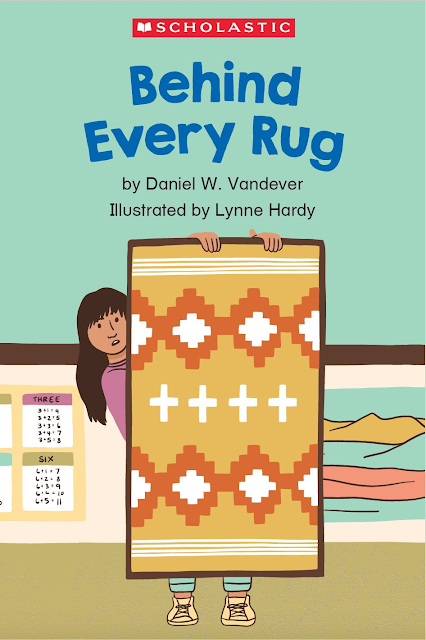▼
Friday, July 05, 2024
Highly Recommended: BEHIND EVERY RUG by Daniel W. Vandever and Lynne Hardy
Those who follow my work know that I've been frustrated many times with things Scholastic does. Sometimes, though, they do a good thing. Case in point? Behind Every Rug.
HIGHLY RECOMMENDED
This little book is by Daniel W. Vandever. I highly recommended his previous books. Fall In Line, Holden! came out in 2017 from Salina Bookshelf and his self-published Herizon came out in 2021. Both won the picture book award from the American Indian Library Association. His newest book, Behind Every Rug is for readers 6-8 years old.
On the first page of Behind Every Rug, we see a little girl, Nizhoni, as she has just gotten off the school bus. Her mom is waiting for her on the sidewalk. Nizhoni is shown in athletic shoes, jeans, a hoodie, and a backpack. Her mother is wearing moccasins, a Navajo-style skirt and woven belt. She's got a set of car keys in her hand.
In other words? This is a story set in the present day.
Online, Vandever said this story is based on his own experiences as a child growing up in St. Louis, Missouri. Some of you are nodding because you know Native people are in big cities and on reservations. Those of you who are nodding are gonna want to get this book, ASAP! You know that wherever we are, people in our families may wear items that reflect who we are, and that in our homes we have items that reflect our cultural identity (in Vandever's book, Diné). For Native students, Vandever's book is a terrific mirror of their lives. Those of you surprised by a story about a Native family -- set in the present day -- you need this book ASAP, too, to give students in your school or classroom a window onto a Diné family's life.
The words on that first page are spoken by Nizhoni, who tells her mom that she has to take something to school the next day that shows her Navajo culture. On subsequent pages, her mom makes suggestions. We see the items her mother is suggesting. And we read Nizhoni's responses to her mom. There's a hesitancy, an anxiety. How will classmates respond to her and the item she chooses to share? Finally, she decides to take the rug she and her grandmother made. She's nervous when her teacher calls her name but students respond positively. Her words remind classmates of people in their families and things they do. Nizhoni then gives them more information about how the rug was made. Visually we're in different place. We see her grandmother, and her grandmother's hogan. In the end, Nizhoni realizes that being different is not scary.
Behind Every Rug is in Scholastic's Our Voices: School & Friends collection. Here's the problem. I can't figure out a way for you to purchase the book. You have to buy a single-copy collection (one copy of ten different books) for $26.99 but you don't know what the other ten books are. Updating on July 14 to say that the editor for the book sent me a link with the titles of the other books. Maybe the information is available and I'm not finding it on the Scholastic website! If you see a way to get just that one book, let me know. If a Scholastic rep sees this post, maybe they'll let us know. Perhaps you can ask your child's teacher or a resource person at your school to order the collection.
And! Just announced today (July 5) is another self-published book from Vandever. Titled We Weave, he shared the cover:
Bottom line? Look for books by Daniel W. Vandever!
1 comment:
----UNSIGNED COMMENTS WILL NOT BE APPROVED.----
In our efforts to have meaningful conversations with people who read AICL and to reduce trolling, we are no longer accepting unsigned comments.
Please include your name (not a pseudonym) and the nature of your interest (like parent, teacher, professor, reviewer, librarian, etc.). If you prefer to withhold identifying information because it may result in backlash to you in your workplace or elsewhere, please write to us directly.



Hello! I am Maria Chang, one of the editors for the book you just reviewed. I'm so glad you like it! It's one of my favorite stories in the Our Voices series as well. You wondered what the other books are in the Our Voices: School & Friends set. Here's a link to the website featuring the books as well as additional resources for exploring more about the different cultures represented in the set: https://www.scholastic.com/content/educators/en/pro/ourvoices.html#school
ReplyDeleteThank you!
~Maria